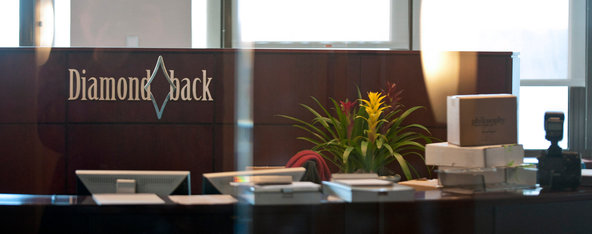 Douglas Healey/Bloomberg NewsDiamondback Capital Management, based in Stamford, Conn., entered into a nonprosecution agreement with the government.
Douglas Healey/Bloomberg NewsDiamondback Capital Management, based in Stamford, Conn., entered into a nonprosecution agreement with the government.
6:00 p.m. | Updated
Diamondback Capital Management, one of the largest hedge funds ensnared by the government’s insider trading crackdown, will not face criminal charges and will pay more than $9 million in civil fines to resolve its role in the investigation.
The hedge fund has entered into a nonprosecution agreement with the United States attorney’s office in Manhattan. The government agreed not to bring criminal charges against Diamondback, citing the fund’s prompt cooperation and voluntary adoption of remedial measures.
And under the terms of the proposed settlement with the Securities and Exchange Commission, Diamondback will forfeit $6 million in ill-gotten gains. It will also pay a civil penalty of $3 million.
In a departure from the S.E.C.’s historical practices, Diamondback’s pact with the S.E.C. does not include language that the fund “neither admits nor denies” any wrongdoing in the case.
This month, the S.E.C. announced that it would no longer permit defendants to “neither admit nor deny” charges if the defendant admitted to or had been convicted of criminal violations. The new policy also applies to cases like the Diamondback one in which a company enters a nonprosecution agreement with criminal authorities.
Diamondback, which is based in Stamford, Conn., was at the center of a big insider trading case brought by the government last week. Federal prosecutors announced criminal charges against seven individuals, accusing them of an insider trading scheme in which they earned a total of $62 million in illegal profits trading Dell stock while in possession of confidential information about the computer company.
Two of the defendants were Diamondback employees. Federal authorities arrested Todd Newman, a former portfolio manager, and announced that a former analyst, Jesse Tortora, had pleaded guilty and was cooperating with the government. The S.E.C. filed parallel civil charges against the fund and the two former employees.
“We believe that the proposed settlement appropriately sanctions the misconduct while giving due credit to Diamondback for its substantial assistance in the government’s investigation and the pending actions against former employees and their co-defendants,” George Canellos, the head of the S.E.C.’s New York office, said in a statement.
A lawyer for Mr. Newman did not immediately respond to a request for comment.
Diamondback was given little chance for survival when F.B.I. agents raided the fund in November 2010 in search of evidence of insider trading. The other three funds raided that fall — Level Global Investors, Loch Capital Management and Barai Capital — have shut down.
Diamondback continues to operate after struggling with negative publicity from the investigation and investor withdrawals. Its assets under management have been cut in half, dropping to about $2.5 billion from more than $5 billion at the peak, according to people briefed on the fund.
In a letter sent to its investors on Monday, Diamondback’s co-founders, Richard Schimel and Larry Sapanski, said that an extensive internal review by the fund’s outside counsel at WilmerHale found no evidence establishing improper trading by any Diamondback employees except for Mr. Newman and Mr. Tortora.
Mr. Schimel and Mr. Sapanski, who both started their careers at SAC Capital Advisors, the giant Connecticut hedge fund run by the billionaire investor Steven A. Cohen, said the fund’s principals, and not its investors, would bear all of the costs related to the investigation.
“We are gratified finally to have reached closure on the government proceedings, and deeply regret the difficulties caused to our investors during the last 14 months,” they wrote in a letter to the fund’s investors on Monday. “Everyone at Diamondback is looking forward to a successful 2012.”
This post has been revised to reflect the following correction:
Correction: January 23, 2012
An earlier version of this article misspelled the last name of Richard Schimel, one of Diamondback’s co-founders.
Article source: http://feeds.nytimes.com/click.phdo?i=2fd66200805e57b3e51eee04bac88dfb